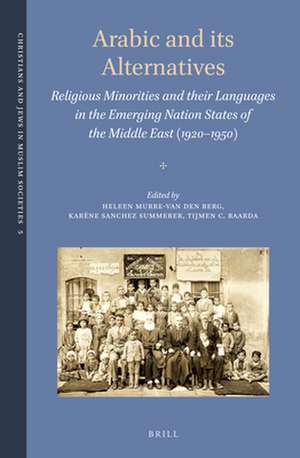Arabic and its Alternatives: Religious Minorities and their Languages in the Emerging Nation States of the Middle East (1920-1950): Christians and Jews in Muslim Societies, cartea 5
Heleen Murre-van den Berg, Karène Sanchez Summerer, Tijmen Baardaen Limba Engleză Hardback – 4 mar 2020
Contributors are Tijmen C. Baarda, Leyla Dakhli, Sasha R. Goldstein-Sabbah, Liora R. Halperin, Robert Isaf, Michiel Leezenberg, Merav Mack,Heleen Murre-van den Berg, Konstantinos Papastathis, Franck Salameh, Cyrus Schayegh, Emmanuel Szurek, Peter Wien.
Preț: 548.72 lei
Preț vechi: 669.17 lei
-18% Nou
Puncte Express: 823
Preț estimativ în valută:
104.100€ • 109.90$ • 87.39£
104.100€ • 109.90$ • 87.39£
Carte indisponibilă temporar
Doresc să fiu notificat când acest titlu va fi disponibil:
Se trimite...
Preluare comenzi: 021 569.72.76
Specificații
ISBN-13: 9789004382695
ISBN-10: 9004382690
Dimensiuni: 155 x 235 mm
Greutate: 0.61 kg
Editura: Brill
Colecția Brill
Seria Christians and Jews in Muslim Societies
ISBN-10: 9004382690
Dimensiuni: 155 x 235 mm
Greutate: 0.61 kg
Editura: Brill
Colecția Brill
Seria Christians and Jews in Muslim Societies
Cuprins
Preface
Heleen Murre-van den Berg
Note on Transcription
Notes on Contributors
1 Arabic and its Alternatives: Language and Religion in the Ottoman Empire and its Successor States
Heleen Murre-van den Berg
2 Vernacularization as Governmentalization: the Development of Kurdish in Mandate Iraq
Michiel Leezenberg
3 “Yan, Of, Ef, Viç, İç, İs, Dis, Pulos …”: the Surname Reform, the “Non-Muslims,” and the Politics of Uncertainty in Post-genocidal Turkey
Emmanuel Szurek
4 “Young Phoenicians” and the Quest for a Lebanese Language: between Lebanonism, Phoenicianism, and Arabism
Franck Salameh
5 “Those Who Pronounce the Ḍād”: Language and Ethnicity in the Nationalist Poetry of Fuʾad al-Khatib (1880–1957)
Peter Wien
6 Arabic and the Syriac Christians in Iraq: Three Levels of Loyalty to the Arabist Project (1920–1950)
Tijmen C. Baarda
7 Awakening, or Watchfulness: Naum Faiq and Syriac Language Poetry at the Fall of the Ottoman Empire
Robert Isaf
8 Global Jewish Philanthropy and Linguistic Pragmatism in Baghdad
Sasha R. Goldstein-Sabbah
9 Past Perfect: Jewish Memories of Language and the Politics of Arabic in Mandate Palestine
Liora R. Halperin
10 United by Faith, Divided by Language: the Orthodox in Jerusalem
Merav Mack
11 Arabic vs. Greek: the Linguistic Aspect of the Jerusalem Orthodox Church Controversy in Late Ottoman Times and the British Mandate
Konstantinos Papastathis
12 Between Local Power and Global Politics: Playing with Languages in the Franciscan Printing Press of Jerusalem
Leyla Dakhli
13 Epilogue
Cyrus Schayegh
Index
Heleen Murre-van den Berg
Note on Transcription
Notes on Contributors
1 Arabic and its Alternatives: Language and Religion in the Ottoman Empire and its Successor States
Heleen Murre-van den Berg
2 Vernacularization as Governmentalization: the Development of Kurdish in Mandate Iraq
Michiel Leezenberg
3 “Yan, Of, Ef, Viç, İç, İs, Dis, Pulos …”: the Surname Reform, the “Non-Muslims,” and the Politics of Uncertainty in Post-genocidal Turkey
Emmanuel Szurek
4 “Young Phoenicians” and the Quest for a Lebanese Language: between Lebanonism, Phoenicianism, and Arabism
Franck Salameh
5 “Those Who Pronounce the Ḍād”: Language and Ethnicity in the Nationalist Poetry of Fuʾad al-Khatib (1880–1957)
Peter Wien
6 Arabic and the Syriac Christians in Iraq: Three Levels of Loyalty to the Arabist Project (1920–1950)
Tijmen C. Baarda
7 Awakening, or Watchfulness: Naum Faiq and Syriac Language Poetry at the Fall of the Ottoman Empire
Robert Isaf
8 Global Jewish Philanthropy and Linguistic Pragmatism in Baghdad
Sasha R. Goldstein-Sabbah
9 Past Perfect: Jewish Memories of Language and the Politics of Arabic in Mandate Palestine
Liora R. Halperin
10 United by Faith, Divided by Language: the Orthodox in Jerusalem
Merav Mack
11 Arabic vs. Greek: the Linguistic Aspect of the Jerusalem Orthodox Church Controversy in Late Ottoman Times and the British Mandate
Konstantinos Papastathis
12 Between Local Power and Global Politics: Playing with Languages in the Franciscan Printing Press of Jerusalem
Leyla Dakhli
13 Epilogue
Cyrus Schayegh
Index
Notă biografică
Heleen Murre-van den Berg, PhD Leiden 1995, is Professor of Global Christianity at Radboud University, Nijmegen and director of the Institute of Eastern Christian Studies. Recent publications include (with S.R. Goldstein-Sabbah), Modernity, Minority, and the Public Sphere: Jews and Christians in the Middle East (Leiden, 2016) and Scribes and Scriptures: The Church of the East in the Eastern Ottoman Provinces (1500-1850) (Louvain, 2015).
Karène Sanchez Summerer, PhD Leiden 2009; Paris 2014, is Associate Professor at Leiden University. Her research considers the interactions between European linguistic and cultural policies and the Arab communities (1860-1948) in Palestine. Recent publication: (K.Sanchez and P. Bourmaud (eds)) Missions/ Powers/ Arabization. Changes and Networks, Social Sciences and Missions (2019) 32, 3-4.
Tijmen C. Baarda is subject librarian for Middle Eastern studies at Leiden University Libraries. His research focuses on Syriac Christianity in the modern Middle East. He has recently defended a PhD dissertation about the use of Arabic, Syriac, Neo-Aramaic and other languages by the Christians of Iraq in the period 1920–1950.
Karène Sanchez Summerer, PhD Leiden 2009; Paris 2014, is Associate Professor at Leiden University. Her research considers the interactions between European linguistic and cultural policies and the Arab communities (1860-1948) in Palestine. Recent publication: (K.Sanchez and P. Bourmaud (eds)) Missions/ Powers/ Arabization. Changes and Networks, Social Sciences and Missions (2019) 32, 3-4.
Tijmen C. Baarda is subject librarian for Middle Eastern studies at Leiden University Libraries. His research focuses on Syriac Christianity in the modern Middle East. He has recently defended a PhD dissertation about the use of Arabic, Syriac, Neo-Aramaic and other languages by the Christians of Iraq in the period 1920–1950.









